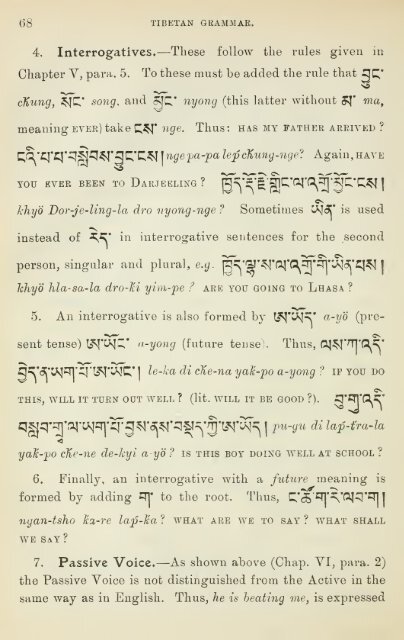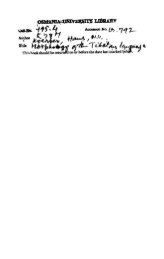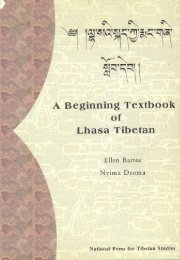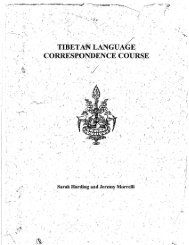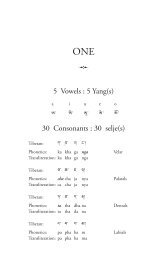- Page 7 and 8:
Qrammar of BY C. K. BELL, 0.2UI.G.,
- Page 9 and 10:
PREFACE TO SECOND EDITION. In tlie
- Page 11 and 12:
PREFACE TO FIRST EDITION OF "MANUAL
- Page 13 and 14:
PREFACE. VU 6. As regards teachers
- Page 15 and 16:
Chapter CONTENTS.
- Page 17:
Adj. = adjective. Adv.= adverb. Art
- Page 21 and 22:
GRAMMAR OF COLLOQUIAl. TIBETAN,. No
- Page 23 and 24:
CHAPTER I. ^l' a Dental t to be pro
- Page 25 and 26:
CHAPTER I. ^' like s in English, bu
- Page 27 and 28:
CHAPTER I. sonants there are only t
- Page 29 and 30:
CHAPTER I. 9 8. Sanskrit Letters*
- Page 31 and 32:
CHAPTER I. 11 12. Wasufs.— Wasur
- Page 33 and 34:
B^'3'5f^' P ^'SI' CHAPTER I. 13 you
- Page 35 and 36:
22. Examples, Qj* five =nga. CHAPTE
- Page 37 and 38: CHAPTER I. 17 27. Irregular Sounds,
- Page 39 and 40: CHAPTER I. 19 Low Tone.—Use this
- Page 41 and 42: CHAPTER I. 21 35. When a prefixed l
- Page 43 and 44: 1. CHAPTER 11. The Article. 7. The
- Page 45 and 46: CHAPTER II. 25 It is a pleasant cou
- Page 47 and 48: CHAPTER II. 27 The wind is strong,
- Page 49 and 50: CHAPTER III. 29^ 2. Nouns denoting
- Page 51 and 52: CHAPTER III. 31 y^' wa-mo, POX, bot
- Page 53 and 54: CHAPTER III. 33 Agent. 2^y^=T|'c5^'
- Page 55 and 56: CHAPTER III. . 35 This man has done
- Page 57 and 58: CHAPTER IV. 37 2. Most adjectives e
- Page 59 and 60: change, thus : £'Q^^'CM^'^'f^^^' C
- Page 61 and 62: CHAPTER IV. 41 The Bhutanese are br
- Page 63 and 64: CHAPTER V. 43 de yin. He is good, p
- Page 65 and 66: CHAPTER V. 45 HOME ? (lit. IS THE M
- Page 67 and 68: CHAPTER. V. 47 time to be distingui
- Page 69 and 70: CHAPTER V, Exercise No. 9. When he
- Page 71 and 72: CHAPTER VI. The Verb, 1. The Tibeta
- Page 73 and 74: CHAPTER VI. 53 first verb keeps the
- Page 75 and 76: CHAPTER VI. 55 for the 1st person,
- Page 77 and 78: Tell (your) petition ! ^(3i*®*®5^
- Page 79 and 80: CHAPTER VI. 5^ ning witli if takes
- Page 81 and 82: CEAPTER VI. 61 —The messenger, wh
- Page 83 and 84: CHAPTER VI. 63 hha di tap-pe ton- f
- Page 85 and 86: ^cn'c&C'^^^'^^ I Jca chi tshony-ro-
- Page 87: CHAPTER VII. The Verb—continued.
- Page 91 and 92: CHAPTER VII. 71 This sentence is fr
- Page 93 and 94: QCJ^'O^C^'^^'Q •>^^] I TIME TO SE
- Page 95 and 96: . Mutton, CHAPTER VII. 75 Thus C'CX
- Page 97 and 98: CHAPTER VII. 77 Did you see the man
- Page 99 and 100: English CHAPTER VIII. 79
- Page 101 and 102: English CHAPTEK VIII. 81 Tibetan wo
- Page 103 and 104: CHAPTER VIII. 83 part of a compound
- Page 105 and 106: CHAPTER VIII. 85 5. In some dialect
- Page 107 and 108: ^^^'^^^'^S I CHAPTKR Vlll. 87 t'o-j
- Page 109 and 110: CHAPTER VIII. 89 P'^«^^' ( Q^^'^'
- Page 111 and 112: CHAPTP]K VIll. 91 The Jong-pen will
- Page 113 and 114: CHAPTER IX. Peonodns. 1. Pronouns a
- Page 115 and 116: CHAPTER IX. 95 If the Lama be an av
- Page 117 and 118: CHAPTER IX. 97 8, Reflective Pronou
- Page 119 and 120: CHAPTER IX. 99 DOWN THEHEj and 5:1'
- Page 121 and 122: CHAPTER IX. 101 between the partici
- Page 123 and 124: CHAPTER IX. 103 genitive, in which
- Page 125 and 126: CHAPTER IX. 105 (a,S=T3i'tMC:' (or
- Page 127 and 128: CHAPTEU IX. 107
- Page 129 and 130: CHAPTER X. 109 verb in most cases,
- Page 131 and 132: CHAPTER X. Ill IS NOT AT ALL GOOD.
- Page 133 and 134: Far off = ^^'-^C^'^'^/iii ring- po.
- Page 135 and 136: CHAPTER XI. 115 prices, e.g., q]U^'
- Page 137 and 138: CHAPTER XI. 117 THE HILL ; C^Q'^^'f
- Page 139 and 140:
^'2oC:i*q(acn:^'Q^KCn"cn'5^*a SyZTj
- Page 141 and 142:
To obtain, CHAPTER XI. procure = (l
- Page 143 and 144:
CHAPTER XII. The Order of Words in
- Page 145 and 146:
CHAPTER XIII. The Honorific Languag
- Page 148 and 149:
128 TIBETAN GRAMMAR. root in their
- Page 150 and 151:
130 TIBETAN GKAM3IAR. [h) ^^' chen,
- Page 152 and 153:
132 riEETAK GRAM.MAK. 12. (5^rCJ'(5
- Page 154 and 155:
134- TIBETAN GRAMMAR. How far have
- Page 156 and 157:
CHAPTER XIV. Miscellaneous. 1. I. M
- Page 158 and 159:
lotS TIBETAN' GRA.AI.AIAl}. 5. Grai
- Page 160 and 161:
140 TIBETAN GftAMMAR. 9. g" tre, MO
- Page 162 and 163:
142 TIBETAN GKAISIMAIJ. 12. Dates.
- Page 164 and 165:
144 TIB K'l'AN ( T K A M 31 A K (
- Page 166 and 167:
CHAPTER XV. A CONVERSATION TRANSLIT
- Page 168 and 169:
148
- Page 170 and 171:
150 TIBETAN GRAMMAR. ^C Past Partic
- Page 172 and 173:
152 TIBETAK GKAMMAR. ^'^15;CC' I ny
- Page 174 and 175:
154 TIBETAN GRAMMAR. When will the
- Page 176 and 177:
156 TIBETAN GRAMMAR." Where have yo
- Page 178 and 179:
158 TIBETAN GRAMMAR. Put those ther
- Page 180 and 181:
160 TIBETAN GRAMMAR. A Tibetan gent
- Page 182 and 183:
162 TIBETAN GRAMMAE. Where did you
- Page 184 and 185:
164 TIBETAN GRAMMAR. No, it is ten
- Page 186 and 187:
166 TIBETAN GRAMMAR. 3^'^C^' [ khe-
- Page 188 and 189:
168 TIBETAN GRAMMAR. phep-chang-nga
- Page 190 and 191:
170 TIBETAN GRAMMAR. Only a few of
- Page 192 and 193:
172 TIBETAN GRAMMAR. Which is the b
- Page 194 and 195:
174 TIBKTAX GRAMMAK. 12. The same c
- Page 196 and 197:
176 TIBETA>7 GRAMMAR. I will call o
- Page 198 and 199:
178 TIBKTAN GRAMMAR. How many house
- Page 200 and 201:
180 TIBETAN GRAMMAR. 14. Crossing a
- Page 202 and 203:
182 TIBETAN GRAMMAR. chho-la tra yd
- Page 204 and 205:
184 TIBETAN GRAMMAR. I shall go to
- Page 206 and 207:
186 TIBETAN GRAMMAR. Yes, about so
- Page 208 and 209:
188 TIBETAN GRAMMAR. (^^^•^'^^•
- Page 210 and 211:
190 TIBETAN GEAMMAE. Please, Sir, p
- Page 212 and 213:
192 TIBETAN GRAMMAR. them. ?:'a5-^'
- Page 214 and 215:
194 TIBETAN GRAMMAR. 21. Buying mea
- Page 216 and 217:
196 TIBETAN GRAMMAR. 22. Buying a t
- Page 218 and 219:
198 TIBETAN GRAMMAR. 23. Buying sil
- Page 220 and 221:
200 TIBETAN GRAMMAR. (Q.^'^'\ ^S 1
- Page 222 and 223:
202 TIBETAN GRAMMAR. A small trader
- Page 224 and 225:
204 TIBETAN GRAMMAR. 25. Deciding a
- Page 226 and 227:
206 TIBETAN GRAMMAR. 26. Paying a v
- Page 228 and 229:
208 TIBETAN GRAMMAR. 27. The same c
- Page 230 and 231:
210 TIBETAN GRAMMAR. Receiving a vi
- Page 232 and 233:
212 TIBETAN GRAMMAR. Receiving a vi
- Page 234 and 235:
214 TIBETAN GRAMMAR. The same conti
- Page 236 and 237:
216 TIBETAN GRAMMAR. 30. The same c
- Page 238 and 239:
218 TI^>yf.AN GRAMMAR. The same con
- Page 240 and 241:
220 TIBETAN GRAMMAR. A visit to the
- Page 242 and 243:
222 TIBETAN GRAMMAR. .32. Diplomati
- Page 244:
224 TIBETAN GRAMMAR. qi'^C I ka-mon
- Page 248:
M ey«/^^ru M \ojuy a^
- Page 251 and 252:
uuip^x^^c|n ^ /5^ ^ Q> H nS /^ C
- Page 253:
U.C.BERKELEY LIBRARIES r.V CDM7DDfi


